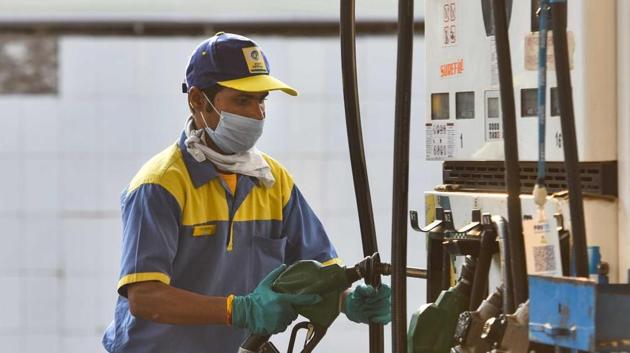Petrol, diesel prices may cross Rs 80 per litre, no immediate duty cut expected
If the full impact of international oil price is passed on to the customer, pump prices of petrol and diesel could cross Rs 80 per litre on Wednesday.
Domestic rates of auto fuels may soon cross the Rs 80 per litre-mark as international oil prices continue to surge, leading to 17th straight hike in retail prices of petrol and diesel that soared to Rs 79.76 per litre and Rs 79.40 a litre, respectively on Tuesday in Delhi, people aware of the development have said.

International benchmark Brent crude surged 1.74% at $43.83 on Tuesday. This was an almost 2% jump which would mean about 60-70 paise per litre hike in petrol and diesel rates, unless oil marketing companies (OMCs) absorb some price shock, executives working on state-run oil marketing companies said requesting anonymity.
If the full impact of international oil price is passed on to the customer, pump prices of petrol and diesel could cross Rs 80 per litre on Wednesday, they added.
Petrol price was hiked by 20 paise a litre and diesel by 55 paise on Tuesday, a day that saw diesel selling at a record level, while petrol is still about Rs 4 a litre away from becoming all-time high. The record price of petrol is Rs 84 per litre on October 4, 2018.
Oil companies have hiked diesel rates by Rs 10.01 per litre and petrol by 8.50 a litre in 17 days.
Executives mentioned above said the main reason for a spike in petrol and diesel rates is high central and state levies that were imposed when global oil prices were very low. The Union government had raised excise duties on petrol and diesel twice – first by Rs 3 per litre each, and later by Rs 10 a litre on petrol and Rs 13 on diesel. A Re-1 per litre hike in excuse duty meant an additional Rs 14,500 crore revenue to the exchequer.
States had also raised value-added tax (VAT) on petrol and diesel since mid-March. The Delhi government raised VAT on petrol and diesel to 30% last month; consequently, retail prices of petrol in the state jumped by Rs 1.67 per litre and diesel by Rs 7.10 a litre. Earlier, the state levies on petrol and diesel were 27% and 16.75%, respectively. Diesel in Delhi also attracts an additional Rs 250 per kilolitre air ambience charge.
“Global oil prices are volatile and impacting domestic petrol and diesel prices. There are some proposal to reduce excise duty rates on auto fuels to provide relief to customers, but it is too early to reduce duties. As government needs huge resources to revive pandemic-hit economy, tax rates cut is not an immediate option,” a government official said requesting anonymity.
The ministries of petroleum and finance, and state-run oil marketing companies – Indian Oil Corp (IOC), Bharat Petroleum Corp Ltd (BPCL) and Hindustan petroleum Corp Ltd (HPCL) – did not respond to queries on this matter.
Domestic consumers have seen a sustained spike in petrol and diesel rates as global oil prices started moving north after the producers’ cartel -- the Organisation of the Petroleum Exporting Countries (OPEC) and its allies, particularly Russia (together OPEC+) – on June 6 decided to extend record output cuts by one more month till the end of July.
The cartel’s move saw benchmark Brent crude jump to $43.93 a barrel in the intraday trade on Tuesday (June 23), 127.26% higher than its low of $19.33 seen on April 21, 2020. India’s average crude oil import price in April 2020 was $19.90 a barrel, while May’s was $30.60 per barrel.
However, global crude oil prices plunging in April and remaining low in May did not help Indian consumers because the government hiked levies that kept retail prices of the two fuels more or less unchanged. Daily price revisions were suspended and retail rates were frozen on March 16, 2020 and they remained unchanged till June 6.
Stay informed on Business News, TCS Q4 Results Live along with Gold Rates Today, India News and other related updates on Hindustan Times Website and APPs



